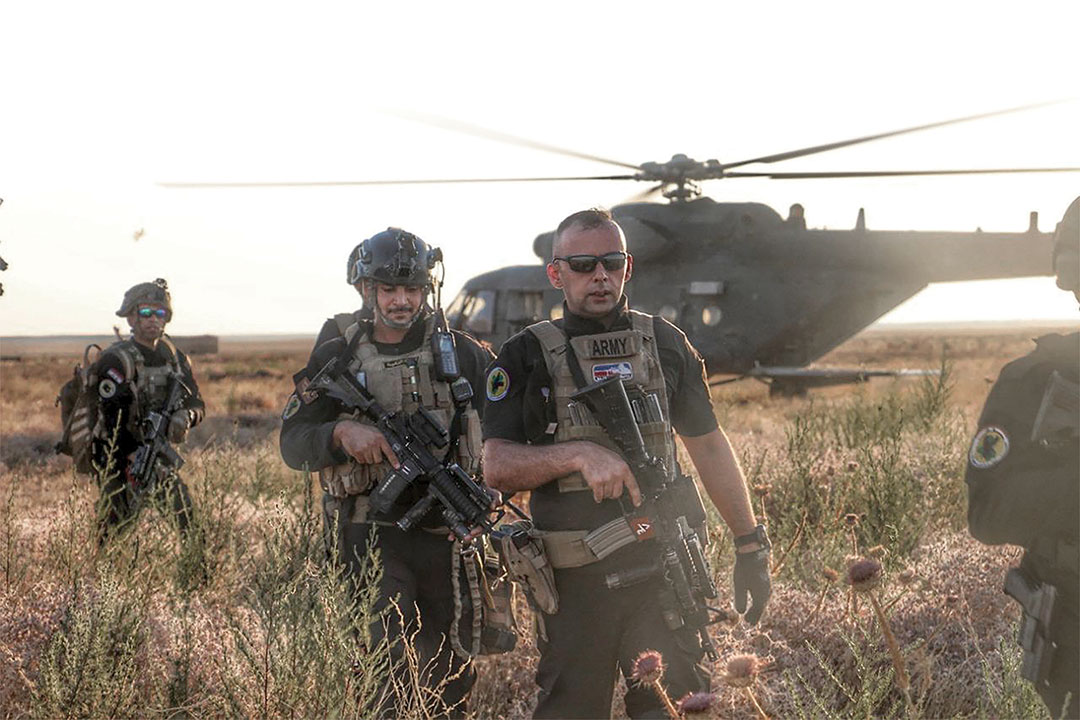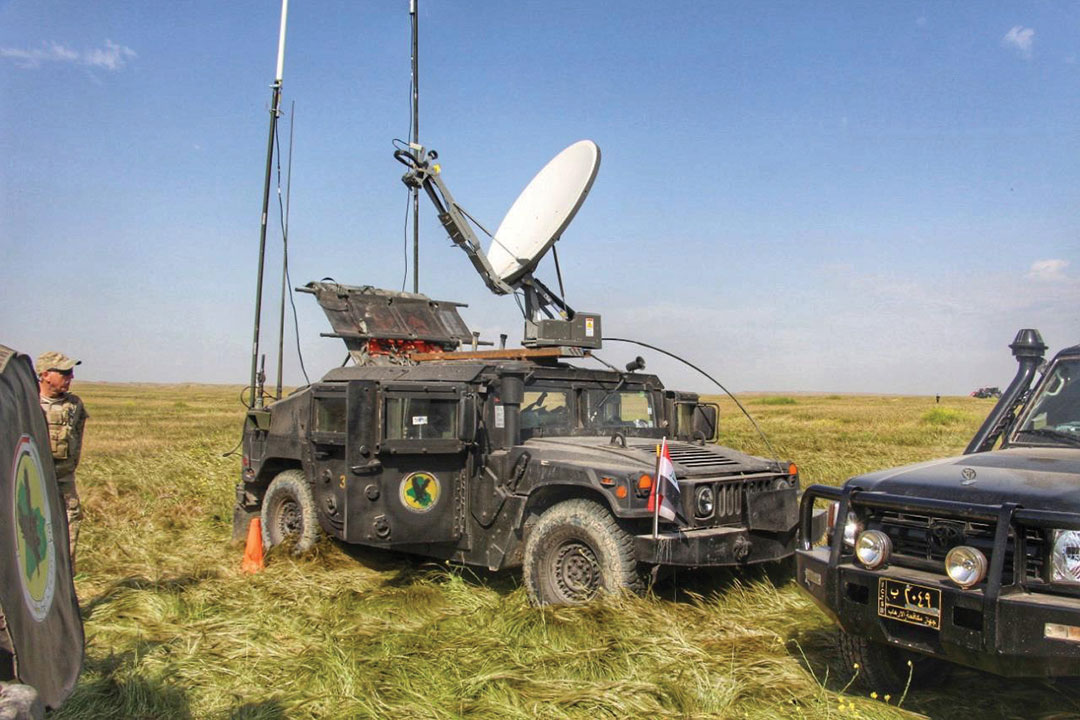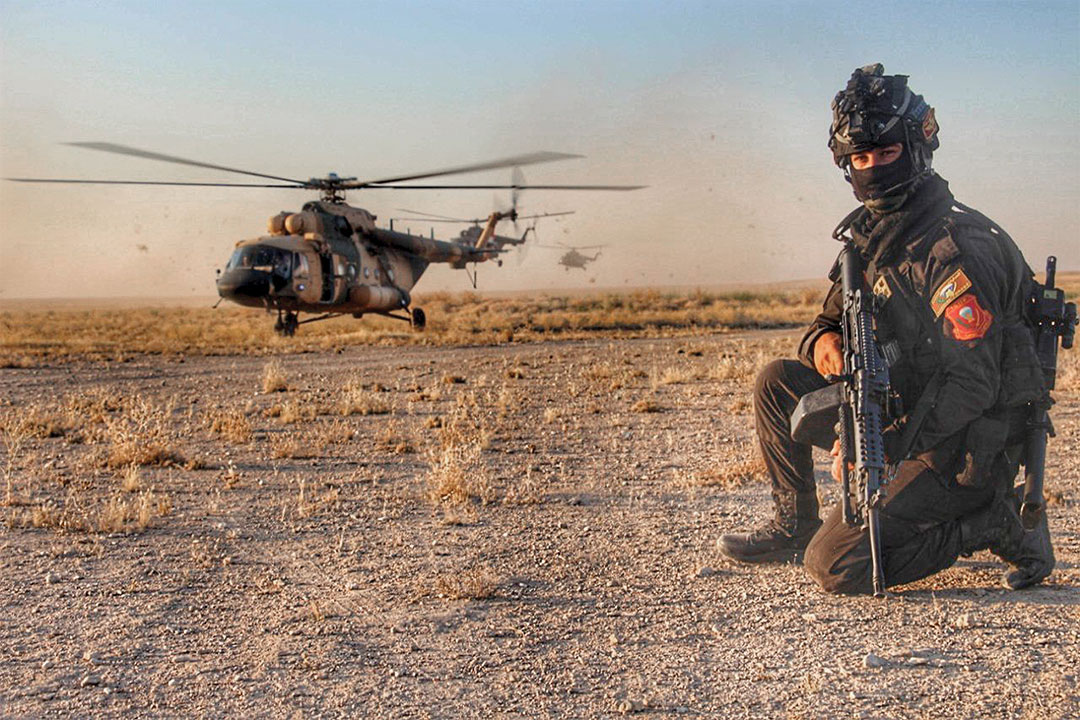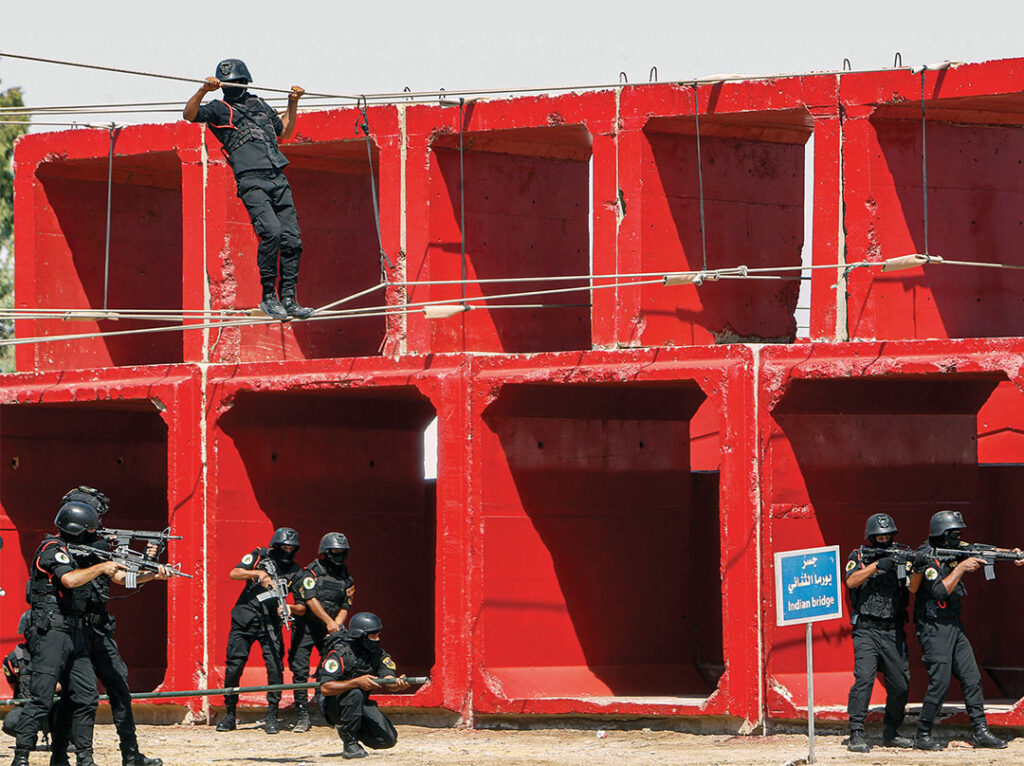After defeating Daesh, Iraq’s Counter-Terrorism Service seeks to upgrade equipment, skills and training
UNIPATH STAFF
 Notwithstanding Daesh’s control over Mosul in June 2014 and the loss of central government control over vast territories between Mosul and Baghdad, a battalion-size force continued to fight inside Mosul, not withdrawing until receiving orders to move on toward Baiji. The force battled its way over more than 300 kilometers to arrive at its destination, retaining all its weapons and equipment, along with the psychological will to continue the fight. Some military commanders refer to this mission as “the miracle.” Staff Gen. Abdul Wahab al-Saidi, commander of the Iraqi Counter-Terrorism Service, said that the morale of counterterrorism forces remains high, along with their determination to carry out their mission, whatever their orders may be. Gen. al-Saidi spoke to Unipath about the secret behind the force’s resilience and his plans to move forward and strengthen the role of this strategic force in maintaining security and stability in Iraq.
Notwithstanding Daesh’s control over Mosul in June 2014 and the loss of central government control over vast territories between Mosul and Baghdad, a battalion-size force continued to fight inside Mosul, not withdrawing until receiving orders to move on toward Baiji. The force battled its way over more than 300 kilometers to arrive at its destination, retaining all its weapons and equipment, along with the psychological will to continue the fight. Some military commanders refer to this mission as “the miracle.” Staff Gen. Abdul Wahab al-Saidi, commander of the Iraqi Counter-Terrorism Service, said that the morale of counterterrorism forces remains high, along with their determination to carry out their mission, whatever their orders may be. Gen. al-Saidi spoke to Unipath about the secret behind the force’s resilience and his plans to move forward and strengthen the role of this strategic force in maintaining security and stability in Iraq.
Unipath: Counterterrorism forces have fought fiercely against Daesh and achieved overwhelming victories. What is the secret to their resilience?
Gen. al-Saidi: At the outset, I would like to thank Unipath for its continued support to the men of the Counter-Terrorism Service and for highlighting our victories against Daesh extremists. As for the secret to our resilience: Counter-Terrorism Service forces have been able to conduct operations falling outside their remit and duties due to their elite-level training and the high quality of their weapons and equipment. Additionally, they adhere to the military doctrine by which the service was formed, to fight all terrorist organizations, and commanders are present with their troops on the front lines confronting the terrorists, with the Counter-Terrorism Service leadership providing constant support. All this has led to us carrying out our missions to the highest standards. We are highly prepared to conduct any mission assigned to us, at any time and under any circumstances.

Unipath: You have suffered losses of human life and equipment. What is your plan to maintain the performance level of the force and to rebuild?
Gen. al-Saidi: Rebuilding requires a lot of time; we are not regular Army forces like the artillery and armored divisions, which have fixed methods for firing and maintaining weapons. We are a security-intelligence force that deals with targeting high-priority terrorist leaders. Our training methods evolve according to the tactics used by the terrorists in launching their attacks. Furthermore, the formation of a counterterrorism specialist requires high-level technical training and specialized skills in identifying terrorists among the members of the community, while maintaining neutrality and not subscribing to ethnic or sectarian views. In other words, we look for applicants with specific qualities to join the ranks of a counterterrorism unit prior to selection, so the process of recruiting and preparing the right individual takes a long time. However, we began a force reorganization process after the battles of liberation ended, in which we focused on the lessons learned and our cumulative experience in the field. As the terrorists change their tactics and develop their combat skills, we must closely examine these tactics to defeat them as quickly as possible — and with few losses. In addition, we focus on certain skills that may be required, such as engineering and support tactics, and the acquisition of advanced equipment that plays a key role in conducting such missions. We have also formed a force specializing in desert operations. Helicopter training has likewise been carried out, involving rapid mobility and vertical landing on rooftops or in narrow streets. This tactic makes the apprehension or killing of terrorist leaders quicker and less complex because it is based on the element of surprise. Also, we have begun to equip our units with modern night-vision technology and advanced vehicles and are working to acquire more sophisticated high-tech vehicles, which will soon be with the Counter-Terrorism Service.
Unipath: What do you mean by desert operations? Does this refer to advanced training or actual military operations?
Gen. al-Saidi: This force is training with coalition forces to specialize in desert environment operations and to eliminate terrorist outposts located in those areas. It is not a large force, but it is an agile one, capable of conducting diverse missions in the most remote desert locations within a short time. It is capable of adapting to and coexisting with the desert, using navigation and tracking techniques, and weapons and equipment that are required in the desert environment. Previously, the terrorists enjoyed freedom of movement in remote desert areas, far from the eyes of the authorities, and had training camps and logistical bases that were difficult to detect or access. However, we will not allow a repeat of the fall of Mosul, and we must monitor the desert through the use of modern technology, such as reconnaissance aircraft. We must communicate with the people of these areas and gain their trust, and also increase helicopter overflights and conduct raids on any suspicious target or location. This tactic will familiarize us with the area of operations and help us identify and destroy terrorist caches and logistics networks.
 Unipath: Following your assumption of the leadership of the counterterrorism service, do you have a force development plan?
Unipath: Following your assumption of the leadership of the counterterrorism service, do you have a force development plan?
Gen. al-Saidi: We have a team that specializes in strategic research, psychological warfare and cyber warfare and a specialist training academy for our forces. I have a five-year plan for commanders to document all future battles, starting with the company commanders and above, to serve as a reference for the development of training methods. We have begun to provide the academy with our combat experience and the tactics deployed by the enemy. We have added this to our training curriculum and have seen the benefits of this plan during the battles of liberation. When units that fought in the battle for Jurf al Sakhar came together with units that fought at al Saqlawiya during the reorganization period at the academy, we discovered that the terrorist groups were using diverse tactics in the field to exploit the battlefield terrain. We benefited greatly from this information exchange in the battles for Fallujah and Mosul. Information exchange is an important and invaluable step in developing combat capability based on experience in the field. Over and above the training of the desert force that I have already mentioned, a naval unit is being formed and trained that will have the expertise and capability to conduct maritime missions, such as anti-piracy operations. We have a force to conduct special missions called Skillful Hunter, which specializes in conducting missions against critical and strategic targets. We have a comprehensive training program, in which a mission is conducted at battalion level. We have completed training for six battalions at Camp Basmaya, and the process is ongoing. In addition to the daily training of all units in the barracks, we have focused on Soldiers’ physical fitness and aim for all units to be operating at the highest fitness level. We are also working on reviewing and developing equipment and supplies at the Counter-Terrorism Service.
Unipath: Is the comprehensive training at Camp Basmaya overseen by the academy or the coalition forces?
Gen. al-Saidi: It is coordinated between the coalition forces and academy staff, and we are working to develop a comprehensive training facility for the Counter-Terrorism Service in coordination with our friends in the coalition forces. I mean to provide integrated training ranges there. This is in addition to existing facilities within the Counter-Terrorism Academy, which usually undertakes the preparation of new recruits. But at Basmaya we will have an advanced training facility large enough to accommodate an entire battalion within dormitories, shooting ranges, gymnasiums and lecture halls. Having a specialist camp like this will impact the capabilities and performance of our forces, and we also plan to train Army units specializing in rapid reaction and first response and commandos and other forces.
Unipath: What is the role of the counterterrorism service post-Daesh?
Are you ready to face future threats?
Gen. al-Saidi: The phase following the defeat of Daesh began after the liberation of our land from the abomination of terrorism. As I mentioned at the start, we are a security and intelligence force, and we track down terrorist leaders and closely follow their movements. During the first quarter of 2020, we achieved huge success in arresting and killing key leaders during recent operations in the Hamrin Mountains, on both the Diyala and the Kirkuk side and during the almost daily ongoing missions taking place in the al Abar, al Rutba and al Hadar regions. We developed a plan to conduct more extensive missions in areas where we have specific intelligence on the presence of terrorists who are fleeing from Syria and the liberated areas and who are hiding in remote desert areas. We have made plans along the lines of those of recent operations.
I can tell you with confidence that the Counter-Terrorism Service is ready to face up to any future terrorist threat. We employ specific strategic studies and training to respond to certain scenarios that may occur on the ground. We conduct spontaneous training operations without equipment or advance planning, to identify the force’s degree of readiness, the precision of its performance and speed of its response in conducting the mission.

Unipath: You went through the recent operations in Hamrin and Kirkuk. Do you believe that you achieved your objectives?
Gen. al-Saidi: First of all, these locations are very remote, and military units had never accessed them before. The so-called emir of Diyala (Abu Idris) was killed after being targeted by an airstrike based on precision intelligence during the operation. Terrorists considered this area to be an impregnable fortress and used it as an alternative headquarters. We found an entire printing press, accommodations and offices used by the terrorists that were all destroyed. We also seized documents and gathered significant intelligence. As for a recent mission in Wadi al Sat, where no force had ever been before, we conducted search and clearance operations in which we destroyed what we discovered. Our message was clear: Counter-Terrorism Service forces are capable of accessing any target in any place, and there is no safe haven for terrorism in Iraq.
Unipath: How far were you from the hideout of the ISIS leadership?
Gen. al-Saidi: The desert region extending from Mosul to the edge of al Anbar is huge, not forgetting to take into account the Syrian Desert. It is a vast and inhospitable place where searching for one person or a group is very difficult. However, I can assure you that there will be no safe long-term hiding place. The terrorists are constantly on the move, and at times there is only an hour or so between us arriving at their hideouts and them having escaped, because we have come across food that is still warm. We have a 24-hour intelligence feed and a specialized team working on tracking them, and God willing, they will be apprehended and brought to justice or killed if they resist arrest.
Unipath: What challenges do you face in achieving your objectives as a leader of this strategic force?
Gen. al-Saidi: We require certain things to assist us in conducting our missions, and these requirements are beyond the means of the Counter-Terrorism Service. By this, I mean that we need state financial support to rebuild these forces. We need additional troops, not to redress the losses we suffered, but because we have so many responsibilities and are small in number. We are in desperate need of certain technology and specialized equipment, which is very expensive. We also need to acquire new vehicles to replace the run-down Humvees. We likewise require a large budget to procure helicopters (Black Hawk) and to provide maintenance and equipment facilities. We are certain that the government is aware of the importance of these requirements, and we hope they can be met, as they will render us superior to the enemy and give us the capability to access their hideouts swiftly and take them by surprise. This would enable us to establish security and stability, and enable the state to devote its attention to developing infrastructure.
Unipath: What does the strategic partnership with coalition special forces mean to you?
Gen. al-Saidi: The future objective of the Counter-Terrorism Service is to create and maintain a terrorism-free environment. The partnership is necessary to achieve this objective because we are fighting a common enemy. This objective is not merely a slogan that we hold to, but constitutes a strategic plan consisting of specific details, that requires material and logistical support for its implementation in the fight against terrorism. This is because the defeat of terrorism is not just based on military victory; it also requires a solid, long-term plan to dry up the sources of financing, put a stop to its promotion and pursue terrorist leaders, and this work cannot be done just within Iraq. There must be cooperation from the regional and international community to achieve this noble aim, since most terrorist networks operate in all corners of the globe; therefore we are in dire need of coordination and partnership with our coalition counterparts. Additionally, our coalition partners played a vital role in the battles of liberation, and still today work alongside us as one team, exchanging expertise, offering logistical support, cooperating in intelligence matters, and providing reconnaissance and air support. We are fighting a common enemy that has the capability of disappearing and reemerging in other countries; therefore, we need a long-term strategy with international partners to enable us to reach this enemy at any time, in any place.

